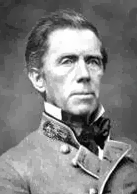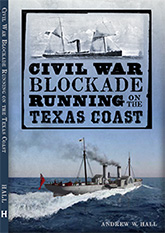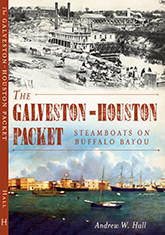 We recently looked at an editorial from the Atlanta Southern Confederacy, arguing loudly against the arming of slaves during the winter of 1864-65. But that view was not universal. The governor of Virginia, William “Extra Billy” Smith (right, 1797-1887), was one of the first prominent Confederate office-holders to urge the Confederate congress to seriously consider the idea, calling upon them to “give this subject early consideration, and enact such measures as their wisdom may approve.” Smith’s call was taken up by an editorial in the Charlottesville Chronicle, that was reprinted in the Richmond Sentinel just before Christmas 1864:
We recently looked at an editorial from the Atlanta Southern Confederacy, arguing loudly against the arming of slaves during the winter of 1864-65. But that view was not universal. The governor of Virginia, William “Extra Billy” Smith (right, 1797-1887), was one of the first prominent Confederate office-holders to urge the Confederate congress to seriously consider the idea, calling upon them to “give this subject early consideration, and enact such measures as their wisdom may approve.” Smith’s call was taken up by an editorial in the Charlottesville Chronicle, that was reprinted in the Richmond Sentinel just before Christmas 1864:

The Message of Gov. Smith takes the bull by the horns. He is not for any mincing experiments. Governor Smith may be surpassed in a certain kind of talent by some of the school that formerly controlled the old Democratic party, and now control the destinies of this country; but he is essentially a practical man, and used to act with the great practical rank and file of the Democratic party. Very sublimated political philosophy he did not pretend to; he knew little of subtle theories and the nicer disputes about States Rights; but he devoted himself to carrying elections, and fighting the battles of the party he belonged to. He has exhibited greater command over the people, and greater political vitality than any other man in Virginia. After his career was supposed to be closed, he came back from California, and wrested his Congressional district from all competitors and all combinations, and held it until the dismemberment of tl1e country. He then — seventy years of age — put himself at the head of a regiment, and plunged into the active operations of the war. Soon he was a brigadier general– and just as bad a one as the rest of our political generals. Then he had himself returned for the Confederate Congress-a general in the army and a member of Congress; and on this he became Governor of Virginia-the second time Governor of Virginia-by the popular suffrage and when there was a conservative feeling prevailing, and we were in the midst of a revolution. . . .
When such a man winds a new note on the bugle, people may well prick up their ears — he has never missed the temper of the popular heart yet — even when he wavered on the Know Nothing question, he was the reflex of the popular feeling, which also wavered — but he missed those shoals, on which that ship stranded. Governor Smith has now taken the boldest step of his life; he has lifted his voice above all his associate leaders; and the key which he has struck will ultimately find its echoes throughout the length and breadth of the land. It is not one measure — novel and startling in its character-that he proposes; but he propounds three grand theses, each one calculated to produce the liveliest sensation, at once: he is for arming the negroes [sic.]; for calling in the Confederate currency; for a law of maximum prices. One scratches his head. . . .
The recommendation about the slaves is also prophetic. They will go in the army, if the war goes on through next year. They will be needed next spring. There will be a storm of opposition; a thousand good reasons will be urged against it; but one imperious consideration will weigh down them all — we shall want men, if the war continues, and it is just simply ridiculous to assert the contrary, without pointing out precisely the grounds for the assertion. Our Southern people have not gotten over the vicious habit of not believing what they don’t wish to believe. Shall we go through another eight months campaign, next year, without meeting the new drafts of the enemy? We certainly have no special fancy for the measure, but just now we are speaking of what is to be — not of our own preferences and objections. Gov. Smith sniffs it in the wind. He will be followed by other Governors, and by Legislative bodies. We shrewdly suspect the Confederate Government is behind Gov. Smith. . . .
On the whole, we like the message, though dissenting to the extent we have signified. We despise the wishy-washy way of doing things one observes in Congress. They seem utterly bewildered. Gov. Smith is at least in favor of something, and he does not shrink. No movement like this can be steered by any timid helmsman. Men are trying to grasp at the future and cling to the past at the same moment. We must elect. If we want to keep the negroes out of the army and avoid other extreme resorts — peace will do it. [1]
________
[1] Richmond Sentinel, December 21, 1864. Quoted in Robert F. Durden, The Gray and the Black: The Confederate Debate on Emancipation (Baton Rouge: Louisiana State University, 1972), 146-47.

 We recently looked at an editorial from the Atlanta Southern Confederacy, arguing loudly against the arming of slaves during the winter of 1864-65. But that view was not universal. The governor of Virginia, William “Extra Billy” Smith (right, 1797-1887), was one of the first prominent Confederate office-holders to urge the Confederate congress to seriously consider the idea, calling upon them to “give this subject early consideration, and enact such measures as their wisdom may approve.” Smith’s call was taken up by an editorial in the Charlottesville Chronicle, that was reprinted in the Richmond Sentinel just before Christmas 1864:
We recently looked at an editorial from the Atlanta Southern Confederacy, arguing loudly against the arming of slaves during the winter of 1864-65. But that view was not universal. The governor of Virginia, William “Extra Billy” Smith (right, 1797-1887), was one of the first prominent Confederate office-holders to urge the Confederate congress to seriously consider the idea, calling upon them to “give this subject early consideration, and enact such measures as their wisdom may approve.” Smith’s call was taken up by an editorial in the Charlottesville Chronicle, that was reprinted in the Richmond Sentinel just before Christmas 1864:






leave a comment